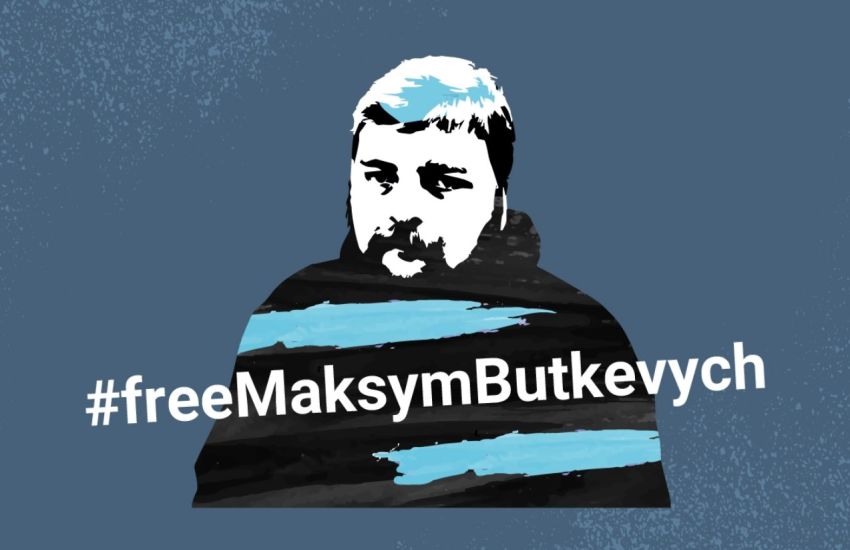
There are grave fears for the safety of Ukrainian anti-fascist and human rights activist Maksym Butkevych, following his capture by Russians troops. Butkevych’s parents and human rights campaigners are calling on the international community to ensure he is guaranteed his rights in accordance with the Geneva Convention.
Butkevych is well-known in Ukraine for his long history of activism dating back to the 1990s. He was a co-founder of No Borders, an NGO dedicated to assisting refugees and internally displaced people in Ukraine. Following the conflict that began in eastern Ukraine in 2014, he dedicated himself to assisting displaced persons from the region and combating discrimination. He also helped asylum seekers facing deportation to Central Asia, Belarus, Russia and other countries.
Butkevych worked with the United Nations High Commissioner for Refugees in Ukraine, Moldova and Belarus as an Associate Regional Public information officer, was a co-founder of ZMINA Human Rights Centre and is a board member of Amnesty International in Ukraine.
Butkevych was also an organiser of various protest movements, including the annual commemoration action for Stanislav Markelov and Anastasia Baburova, two Russian anti-fascists murdered in Moscow in 2009.
As a journalist, Butkevych co-founded Hromadske Radio and worked for outlets such as the BBC World Service and several Ukrainian TV channels. He provided training to journalists on how to counter racism and discrimination in the media.
Like many others, Butkevych felt he had no option but to join the Ukrainian Armed Forces after Russian President Vladimir Putin invaded his country. Sharing a photo of himself in military gear, Butkevych wrote on Facebook in March: "Unfortunately, I have to put my refugee assistance, humanitarian, and human rights activism on hold. I think you can understand why from the photo ... There are times when you have to be ready to defend what is important — I firmly believe that. And the rest — after the victory.”
In April, he told Hromadske Radio: “I have been an anti-militarist all my conscious life and remain so by conviction. [But] I will do as much as I can to protect what is most valuable.”
Victory, Butkevych said, was not just about liberating Ukrainian territory: “It is also about what we will be like [afterwards] … I hope it will not make us so cruel that we put human rights on the back burner. We fight precisely to retain the opportunity to embody the values we stand for.”
Russian forces captured Butkevych, along with other members of his unit, near the village of Hirske in the Luhansk oblast on June 24. His family were made aware of his capture via a video posted on social media by Russian propagandists a few days later. They have not heard from him and have no idea of his whereabouts or the conditions he is being held under.
While his family initially chose to not go public with his case, they felt the need to speak out due to the allegations made by Russia against Butkevych, which indicate his safety could be at risk.
Butkevych's father, Oleksandr, told Hromadske Radio on July 12: “Propaganda fakes and distortions about Maksym began to be disseminated in the Russian media landscape from the very first day. The danger lies in the fact that they began to call him a Nazi, saying that his human rights activities are only a ‘cover’, ‘a legend under which a fascist, commander of a punitive platoon hid’.
“All this, of course, is done to create a basis for removing Maksym from the ranks of prisoners of war and separately charging him with terrorism, an attack on the state system, or something else.
“The only thing we can and must do is to cover and disseminate the truth about Maksym as much as possible. This will neutralise the terrible Russian propaganda that continues to spread and is extremely damaging. This is immensely important. The truth and only the truth is the only thing to counter Russian lies.”
Reflecting on the “very nightmarish reality people in Ukraine found themselves in”, Butkevych wrote in early May that “this reality was set up by war criminals with [a] totalitarian and xenophobic worldview calling themselves ‘antifascists’, labelling their opponents (those who stand for human rights and civil liberties in the first place) ‘Nazis’.”
Butkevych continued: “There is something very wrong, as deeply broken as the world itself, with the need to use killing machines in order to ensure victory of life, even in 2022. This is probably another important point in the long list of accusations against Putin and his fellow genocidal war criminals, even if this one won’t make it to the earthly International Tribunal: invaders made even those Ukrainians who were peaceful and non-violent, hate and willing to kill them.
But he added: “We should not allow hatred and pain to blind us, to make us surrender our openness and diversity, our empathy and freedoms. Neither should we allow them to infect us with the spirit of creeping death by denying other human beings dignity we treasure so much, by normalising hatred propaganda and preserving dehumanisation attitudes beyond the battlefield. This battle will be tough and long as well — but it will be worth it. And I am sure we will be able to win this one as well.”